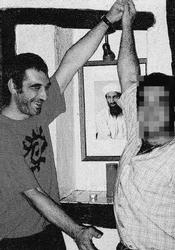IN CASE there's still doubt that a possible connection between the "secular ETA" and the "radically religious Islamic terrorists" is far from metaphysically impossible, as judge Baltasar Gazón said, let me introduce you to Iñigo Elkoro:

Mr Elkoro is the guy dancing on the left; I guess I don't have to say whose picture it is in that altar on the background.
The picture appeared a few days ago in an article in La Vanguardia (link in Spanish; free reg. req.), the centenarian and most respected Barcelona newspaper. The most interesting thing is that according to La Vanguardia the picture comes from the judicial summary of Mr Elkoro's indictment as ETA collaborator. Guess who was the judge in charge from the case? None other than judge Garzón, the same one who said that any connection between ETA and Islamic terrorists was "metaphysically impossible" (against the allegations of Aznar and the Popular Party, who claim that there is a long history of contacts between ETA and Arab terrorists and therefore it can't be ruled out yet that the March 11 attacks were a joint operation). Not that he thought that in the particular case of the March 11 attacks he thought that there was no connection, no; what he said went much further: that it was 'metaphysically impossible', meaning that there's no way that there could be any connection at all.
So judge Garzón, though he had been in charge of a summary in which there was at least some indication that a connection between ETA and Islamic terrorist was not impossible, appears at the parliamentary commission investigating the Madrid attacks and says that such a contact was 'metaphysically impossible'. He also 'forgot' to tell the commissioners that he had been wiretapping the phones of two of the March 11 ringleaders until one month before the attack (in Spain's legal system it's the judges, not the prosecutors, who instruct the judicial summaries); did he fail to pass a warning for what he had learnt from these intercepted conversations?
Do you think that what Garzón did, o did not, might have something to do with his pro-Socialist trajectory (actually, he was deputy Interior minister in the mid-90s, during Felipe González administration)?





<< Home